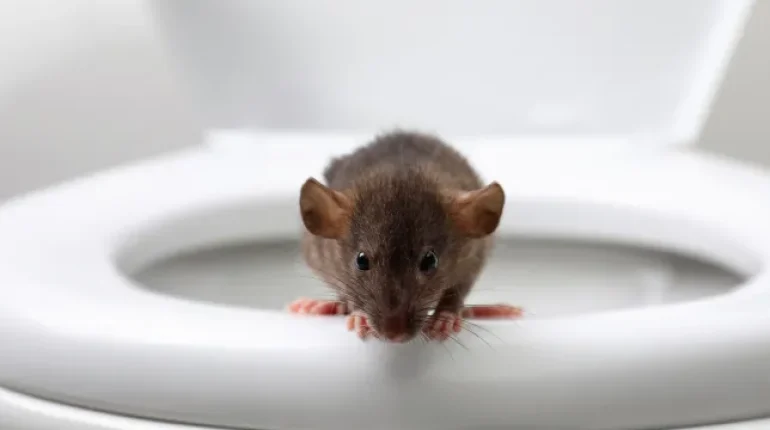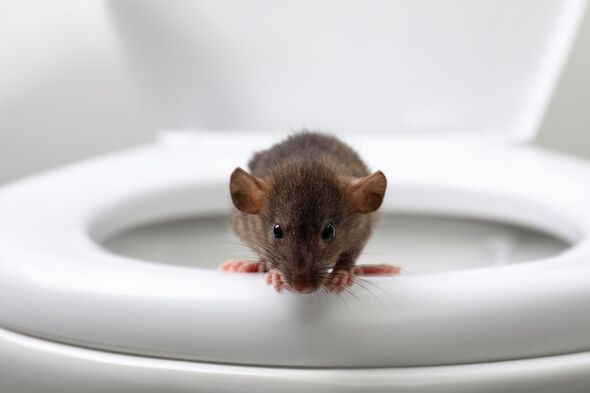Toilet Terror: Man Hospitalized After Rat Bite in Bathroom

Posted April 12, 2024 by: Admin
In a shocking incident that highlights the potential dangers lurking in our everyday lives, a 76-year-old man from Montreal, Canada, found himself in a hospital after a terrifying encounter with a rat in his toilet. The unusual nature of this incident has captured the attention of many, as it serves as a stark reminder that even our most private spaces can be invaded by unwanted pests.
The man’s ordeal began when he discovered a rat in his toilet bowl. In an attempt to remove the rodent, he reached into the toilet, only to be bitten on two of his fingers. Startled and concerned, the man immediately rushed to the hospital, where doctors administered a tetanus jab and sent him home, believing the incident to be relatively minor.
However, 18 days later, the man’s condition took a turn for the worse. He returned to the hospital, complaining of severe fever, headaches, and abdominal pain that had persisted for several days. Although the wounds on his fingers had mostly healed, the man’s overall health had deteriorated significantly. Upon examination, doctors found that his blood pressure was alarmingly low, and his heart rate was exceptionally high.

As medical professionals delved deeper into the man’s condition, initial blood tests revealed that his kidneys had suffered damage, and his blood platelet count was dangerously low. Platelets play a crucial role in the body’s ability to form clots and prevent excessive bleeding. The man’s deteriorating health prompted doctors to admit him to the intensive care unit, where he was diagnosed with multi-organ dysfunction and sepsis, a life-threatening condition in which an infection triggers an overwhelming immune response.
After conducting thorough blood and urine tests, doctors finally identified the culprit behind the man’s severe illness: leptospirosis, an infectious disease believed to have been transmitted by the rat bite. Leptospirosis is a bacterial infection that can cause a wide range of symptoms and can lead to severe complications if left untreated. Armed with this knowledge, the medical team promptly administered antibiotics and provided supportive care to address the man’s kidney damage and low platelet levels. Thanks to the timely intervention and appropriate treatment, the man’s condition gradually improved, and he was eventually discharged from the intensive care unit.
Leptospirosis is a zoonotic disease, meaning it can be transmitted from animals to humans. The disease is typically contracted through contact with the urine of infected animals or exposure to contaminated soil or water. While leptospirosis is commonly associated with farm animals such as cattle, pigs, and horses, it can also be spread by dogs, raccoons, and, as seen in this case, rats. The bacteria responsible for leptospirosis can enter the body through various routes, including the eyes, nose, mouth, or broken skin. Drinking contaminated water can also lead to infection, making it crucial to be aware of potential sources of contamination.

Individuals who contract leptospirosis often experience a range of symptoms, including fever, headache, and muscle pain. As the infection progresses, some may develop additional symptoms such as vomiting, diarrhea, abdominal pain, and a skin rash. While most cases of leptospirosis can be effectively treated with antibiotics, approximately 10% of infected individuals may develop severe complications. These severe cases can lead to multi-organ dysfunction, a life-threatening condition that requires immediate medical attention and intensive care.
To prevent leptospirosis, it is essential to take precautions when interacting with animals and their environments. Avoiding contact with potentially infected animals and their urine is crucial. Maintaining a clean and rat-free living space is also important in reducing the risk of exposure. If an animal bite or scratch occurs, it is vital to clean the wound thoroughly and seek medical attention promptly. Taking these preventive measures can significantly reduce the chances of contracting leptospirosis and other zoonotic diseases.
Rat infestations are a common problem in many urban areas, posing significant health risks to residents. These pests can carry various diseases, including leptospirosis, and can contaminate food and living spaces with their urine and feces. Proper pest control and sanitation measures are essential in preventing rat infestations and minimizing the potential for disease transmission. Regularly inspecting and sealing potential entry points, keeping food in sealed containers, and disposing of garbage properly can help deter rats from invading homes and buildings.

The man’s harrowing experience serves as a powerful reminder of the importance of being vigilant about potential health risks, even in the most unexpected places. This unusual case highlights the need for prompt medical attention following any animal bite, regardless of the perceived severity. It also emphasizes the significance of maintaining a clean and pest-free living environment to minimize the risk of exposure to zoonotic diseases. By raising awareness about the potential dangers of leptospirosis and other animal-borne illnesses, we can encourage individuals to take proactive steps in protecting their health and well-being.
In conclusion, the 76-year-old man’s encounter with a rat in his toilet and his subsequent battle with leptospirosis underscore the potential dangers that can arise from seemingly innocuous interactions with animals. This incident serves as a wake-up call for us all to be more aware of the risks associated with zoonotic diseases and to take appropriate measures to prevent infection. By promoting education, encouraging prompt medical attention for animal bites, and advocating for effective pest control and sanitation practices, we can work together to reduce the impact of leptospirosis and other zoonotic diseases on our communities. Let this man’s story be a reminder to remain vigilant and proactive in safeguarding our health and the health of those around us.

















